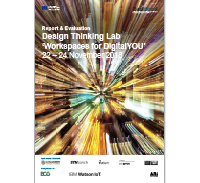Report & Evaluation: Design Thinking Lab ‘Workspaces for DigitalYOU’

The way we work is rapidly changing. Social and technological drivers transform how we interact. What are potential scenarios of working, co-creating and innovating together beyond the spaces we know today? How will we work in the future and how will we need to adapt our physical workspaces to incorporate the digital? What can the disciplines of architecture, management and information technology contribute together in this challenge?
In the third activity at TUM, the focus was directed towards future workplaces and how the working processes in consulting industries are transformed. Together with international consulting firm Boston Consulting Group and information technology company IBM Watson IoT, a 3-day design thinking lab was conducted with Master’s degree students from architecture, management and information technology. Workspaces for the future were thought from a people, technology and building-driven perspective. The 24 participants were asked to explore ‘Workspaces for DigitalYOU’ and create compelling workspace experiences in the digital and physical world.
The design thinking lab followed the IBM Enterprise Design Thinking Field Guide and was facilitated with one person for each team. The structured agenda foresaw design challenges, tools and time frames for the duration of three days. The 24 participants were assigned prior to specific teams to ensure an interdisciplinary mix of students.
43% female / 57% male
100 % master degree
82 % TUM student / 18% incomings
The teams were facilitated throughout the three days by one researcher of the BauHow5 Alliance or one design thinker of IBM:
Day 1 // Context & Challenge
Day 2 // Ideation & Concept
Day 3 // Prototype & Pitch
The workshop was part of the 3-year Erasmus+ Strategic Partnership “Strengthening Architecture and the Built Environment Research” (SABRE), a collaboration of the BauHow5 alliance, the partnership of five leading European research intense universities in architecture and the built environment (UCL, TU Delft, Chalmers, ETHZ, TU Munich). SABRE is co-funded by the Erasmus+ programme of the European Union.
Report & Evaluation: Design Thinking Lab ‘Workspaces for DigitalYOU’
Editors: Christos Chantzaras, Martin Luce, Yolande Schneider
Publisher: Technische Universität München, Fakultät für Architektur
ISBN: 978-3-948278-16-8